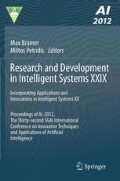Abstract
Numerical weather prediction models can produce wind speed forecasts at a very high space resolution. However, running these models with that amount of precision is time and resource consuming. In this paper, the integration of the Weather Research and Forecasting – Advanced Research WRF (WRF-ARW) mesoscale model with four different downscaling approaches is presented. Three of the proposed methods are mathematical based approaches that need a predefined model to be applied. The fourth approach, based on genetic programming (GP), will implicitly find the optimal model to downscale WRF forecasts, so no previous assumptions about the model need to be made. WRFARW forecasts and observations at three different sites of the state of Illinois in the USA are analysed before and after applying the downscaling techniques. Results have shown that GP is able to successfully downscale the wind speed predictions, reducing significantly the inherent error of the numerical models.
Access this chapter
Tax calculation will be finalised at checkout
Purchases are for personal use only
Preview
Unable to display preview. Download preview PDF.
References
Monteiro, C., Bessa, R., Miranda, V., Boterrud, A., Wang, J. and Conzelmann, G. Wind Power Forecasting: State-of-the-Art 2009, INESC Porto and Argonne National Laboratory, 2009. Tech. Rep.
Bilgili, M., Sahin, B., Yasar, A. Application of artificial neural networks for the wind speed prediction of target stations using reference stations data. Renewable Energy, vol. 32, pp. 2350-2360, 2007.
Landberg, L. Short-term prediction of the power production from wind farms. Journal of Wind Engineering and Industrial Aerodynamics, vol. 80, pp. 207-220, 1999.
Landberg, L. Short-term prediction of local wind conditions. Journal of Wind Engineering and Industrial Aerodynamics, vol. 89, pp. 235-245, 2001.
Constantinescu, E.M., Zavala, E.M., Rocklin, M., Sangmin Lee, Anitescu, M. A computational framework for uncertainty quantification and stochastic optimization in unit commitment with wind power generation. IEEE Transactions on Power Systems, vol. 26, pp. 431- 441, 2011.
Alexiadis, MC., Dokopoulos, PS., Sahsamanoglou, H., Manousaridis, IM. Short-term forecasting of wind speed and related electrical power. Solar Energy, vol. 63(1), pp. 61-68, 1998.
Salcedo-Sanz, S., Perez-Bellido, A.M., Ortiz-Garcia, E.G., Portilla-Figueras, A. Hybridizing the fifth generation mesoscale model with artificial neural networks for short-term wind speed prediction. Renewable Energy, vol. 34, pp. 1451-1457, 2009.
Illinois Institute of Rural Affaris, 2012. Illinois wind monitoring program, accessed 1 January 2012, <http://www.illinoiswind.org>.
Luo, W., Taylor, M. C., Parker, S. R. A comparison of spatial interpolation methods to estimate continuous wind speed surfaces using irregularly distributed data from England and Wales. International Journal of Climatology, vol. 28, pp. 947-959, 2008.
Poli, R., Langdon, W.B., McPhee, N.F. A field guide to genetic programming, accessed April 2012, <http://www.gp-field-guide.org.uk> (With contributions by J.R. Korza).
Flores, J. J., Graff, M., Cadenas, E. Wind prediction using genetic algorithms and gene expression programming. In Proc. Of the Int’l Conf on Modeling and Simulation in the Enterprises, AMSE 2005. Morelia, Mexico, 2005.
Amil, N.M., Bredeche, N., Gagne, C. A statistical learning perspective of genetic programming. In Proceedings of the 12th European Conference on Genetic Programming, EURO GP’09, vol. 6(104), pp. 327-338, Berlin, Heidelberg, 2009.
Liu, Y., Khoshgoftaar, T. Reducing overfitting in genetic programming models for software quality classification. In Proceedings of the Eighth IEEE International Symposium on High Assurance Systems Engineering, HASE’04, pp. 56-65, 2004.
Gonçalves, I., Silva, S. Experiments on Controlling Overfitting in Genetic Programming. 15th Portuguese Conference on Artificial Intelligence (EPIA 2011), Oct 2011.
Sweeney, C., Lynch, P., Nolan, P. Reducing errors of wind speed forecasts by an optimal combination of post-processing methods. Meteorological Applications, doi, 10.1002/met.294
Author information
Authors and Affiliations
Corresponding author
Editor information
Editors and Affiliations
Rights and permissions
Copyright information
© 2012 Springer-Verlag London
About this paper
Cite this paper
Martinez-Arellano, G., Nolle, L., Bland, J. (2012). Improving WRF-ARW Wind Speed Predictions using Genetic Programming. In: Bramer, M., Petridis, M. (eds) Research and Development in Intelligent Systems XXIX. SGAI 2012. Springer, London. https://doi.org/10.1007/978-1-4471-4739-8_27
Download citation
DOI: https://doi.org/10.1007/978-1-4471-4739-8_27
Published:
Publisher Name: Springer, London
Print ISBN: 978-1-4471-4738-1
Online ISBN: 978-1-4471-4739-8
eBook Packages: Computer ScienceComputer Science (R0)

